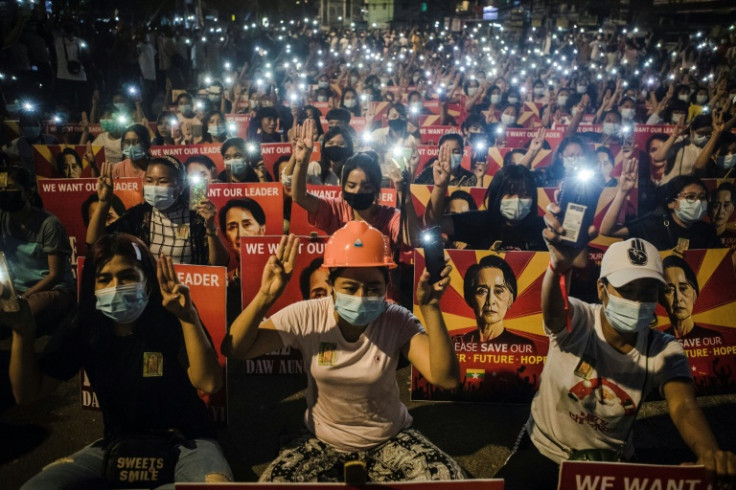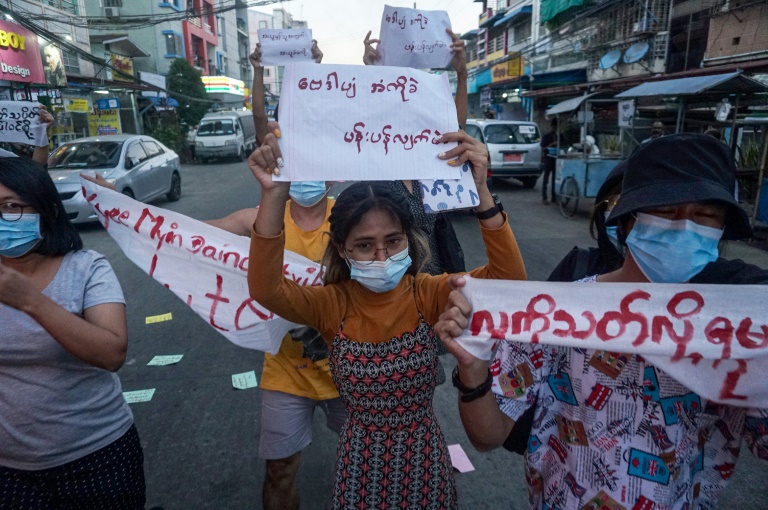Student activist Lin Lin led protests against Myanmar’s junta, defying the generals for months before being hunted down and caught.
Now serving a 15-year sentence, she regrets nothing.
“I wanted to do that more than anything else,” she told AFP during her trial.
“And if you ask what I will do if I am released, I will do it again.”
The 25-year-old psychology student grew up during a rare semi-democratic interlude in Myanmar.
When the military staged a coup in February 2021 citing unsubstantiated claims of electoral fraud, she joined millions of others demonstrating in the streets.
Soldiers fired live bullets into the crowds, arrested thousands and carried out nighttime raids on suspected dissidents.
The demonstrations gradually fizzled out, but Lin Lin was determined to find a way to keep defiance against the junta at the top of people’s minds.
Inspired by democracy flashmobs in Hong Kong and elsewhere, she began organising
protests around Yangon.
She used messaging apps to summon dozens of young protesters, who would converge under colonial-era tenements, outside shopping malls, or at parks and markets.
They would light flares and unfurl banners, a thicket of hands raised in the Hunger Games-inspired three finger salute that has become popular among pro-democracy protesters.
Others criticised the junta through megaphones as passers-by looked on.
Seconds later, the protesters would break apart, scattering down side streets or into waiting vehicles before security forces could arrive.
Each event was filmed and the footage uploaded to social media or sent to journalists abroad.
AFP interviewed Lin Lin during that time in late 2021, when she was living one step ahead of the police and security forces.
“During the protests, I have so much adrenalin,” she said from a dim, bare room that would be home for a couple of days.
“It’s like my heart is trying to come out of my mouth.”
With the military tightening its grip on life in Yangon, the rush of each protest was followed by fear.
Lin Lin said goodbye to her family and went underground in the commercial hub of around eight million people, changing safehouses every few days and always dreading a knock at the door.
“I can’t sleep the whole night,” she told AFP at the time.
“When I see the sun’s rays in the morning, I feel like I’m safe. After that, I can sleep well.”
Security forces have used torture and sexual violence in their crackdown on dissent, rights groups say, and in 2022, the United Nations rights office said at least 290 people had died in custody.
A flash protest in December 2021 organised by another student group in Yangon was rammed by a passing military vehicle, leaving at least three wounded.
Lin Lin’s luck ran out that same month.
As she made her way to a protest rendezvous, she was arrested by plainclothes police.
“I had prepared for the worst… but when I was suddenly faced by it, my mouth opened and I just said ‘Huh?'” she said from prison.
“I was also thinking to run at first, but the road was very open and they had guns.”
In March 2022 a junta-controlled court jailed her for three years under a law that outlaws any action deemed to undermine the military.
The junta has exploited this law — authored during the British colonial era — as a catch-all weapon against dissent, using it to jail protesters, actors, and journalists.
Lin Lin was later jailed for another two years for possessing a fake ID.
More than 26,000 political prisoners have been arrested by the junta since the start of the coup, according to a local monitoring group.
The monotony of life in prison is broken occasionally by food parcels from home.
Only when she meets family members at court hearings is Lin Lin able to hear news of the turmoil that continues to rock Myanmar more than three years since the coup.
“I avoid depression by thinking of what I did before I was arrested,” she said.
She also writes letters to the friends she protested alongside.
“She never mentions her feelings,” said Helen, who helped Lin Lin organise flashmob protests and also spent time in jail.
“She doesn’t want us to be depressed,” she said, requesting a pseudonym for security reasons.
With the military monitoring letters to inmates, political topics are off-limits.
Instead, they write of hotpot and plan trips they will take together in the future.
But last month, a court sentenced Lin Lin to another 10 years for contact with a “terrorist” organisation.
“I’m worried that she can’t make it if she has to stay in prison for too long,” Helen said.
Lin Lin has stopped counting down the days to her release date.
“I don’t want to ask myself how long it is before I can come home,” she said.
“I just accept I can come back home after the revolution (against the junta) has won.”
AFP

AFP







